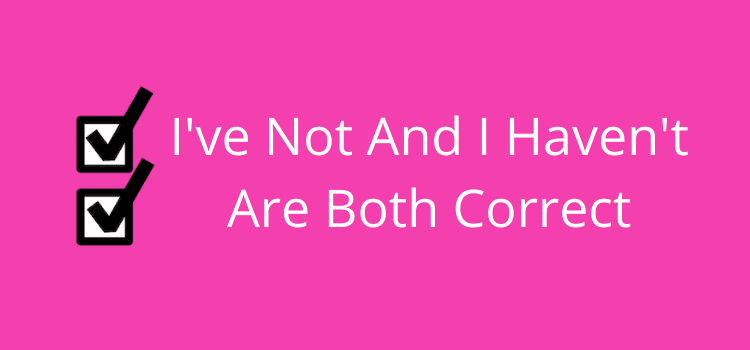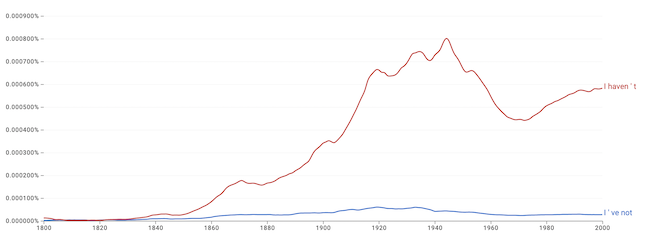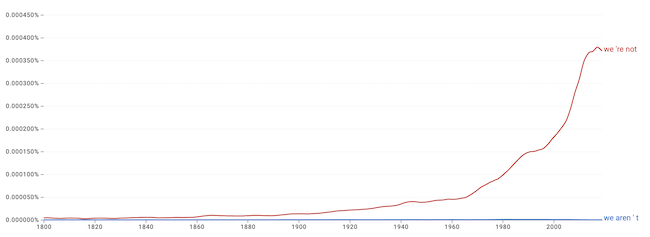I’ve not and I haven’t are both perfectly correct contractions in writing and speaking.
It is because some auxiliary verbs followed by not can be contracted in two ways.
You can either contract the verb or the word not.
While they are equal in meaning, your preference often depends on the variety of English you use.
I’ve not and I haven’t in use with examples
Usage can differ, particularly between US, British and Australian English.
I’ve not seen your brother for ages. Is he doing well?
I haven’t seen your brother for ages. How’s he doing?
The same contractions work for the third person verb, has.
She’s not been herself lately. I think she has problems at work.
She hasn’t been herself lately. I think she’s got problems at work.
In US English, the second examples are probably the most frequent form.
But the first examples are common in British English and even a little more so in Australian English.
Another note is that the second sentence in the examples can often be a little less formal when using haven’t and hasn’t.
In the end, though, the differences are minimal.
You have choices with certain contractions
Because there are often two choices for the forms of contraction with perfect and progressive tenses, it’s up to a writer to select the most appropriate one.
It depends on whether it’s dialogue to suit a character or if you want to add emphasis.
He hadn’t experienced anything like it in his life.
He’d not experienced anything like it in his life.
The second example is very similar to using never.
He’d never experienced anything like it in his life.
But using not instead of never perhaps makes it more definitive.
Anytime you have an auxiliary verb with not and a present or past participle, you have the choice.
He isn’t being negative; he’s simply being honest.
He’s not being negative; he’s simply being honest.
I promise you; I haven’t changed a single word in your report.
I promise you; I’ve not changed a single word in your report.
In either form, you will always be correct. But it can be a matter of nuance when you choose.
What about we’re not and we aren’t?
It’s strange because, with this form, it’s the opposite in the regularity of usage.
Here’s the usage of I’ve not and I haven’t according to Google Ngram.
It’s quite clear that I haven’t is the most used form by a long way.
But when we use the verb are with the negative, it’s the reverse result.
Compare these two sentences.
It was difficult because we aren’t used to such cold weather.
It was difficult because we’re not used to such cold weather.
So as you can see, it’s much more common to use we’re not than we aren’t.
Be wary of double contractions
Yes, double contractions are common in speaking.
I shouldn’t’ve trusted the information in the newspaper article.
He wouldn’t’ve passed the exam without my help.
But in writing, it’s best to avoid them and use one contraction only.
I shouldn’t have trusted the information in the newspaper article.
He wouldn’t have passed the exam without my help.
Also, with the third conditional, or if you use inversion, it can often lead you to double contractions in the second clause.
If I’d known you weren’t coming, I wouldn’t’ve gone to all the trouble of cooking dinner.
Had I known you weren’t coming, I wouldn’t’ve gone to all the trouble of cooking dinner. (Inversion)
Again, it’s far better in writing to use only one contraction.
If I had studied more, I wouldn’t have failed the test.
Had I studied more, I wouldn’t have failed the test. (Inversion)
One other error to avoid here is should of or would of, which is a common grammar mistake.
Avoid contractions with nouns in writing
Writing and speaking are not always the same.
When speaking, we almost always contract verbs with the subject if possible.
Mary’s going to get married on Saturday.
Mary’s got her wedding on Saturday.
In writing, however, it’s always better to avoid these unless there is a specific necessity in dialogue.
Mary is going to get married on Saturday.
Mary has got her wedding on Saturday.
For clarity, it’s better to write phrases like these without contractions.
No contractions in formal writing
Writers of fiction, short stories, or informal articles can choose when to use contractions.
But all words are written in full for formal texts, such as business correspondence and academic or technical publishing.
I’ll advise the chairperson that I can’t attend the committee meeting this month because I’ve been selected for jury duty. (Informal)
I will advise the chairperson that I will not be able to attend the committee meeting this month because I have been selected for jury duty. (Formal)
One verb that can cause difficulty in formal writing when using the negative form is can’t.
While can not or cannot are both correct, sometimes it is better to use will not be able to.
Summary
As a writer, you can choose between I’ve not and I haven’t, or we’re not and we aren’t depending on the context.
No hard and fast rules apply to which choice is better or preferable.
When writing dialogue, choosing your contracted forms can help with character development and consistency.
When publishing articles, blog posts, or other forms of informal writing, you might want to stay with certain contraction forms that suit your writing style.
Contraction might seem like a minor grammar point. But it is one that gives you the possibility to fine-tune the tone of your writing.
Related reading: A Dangling Modifier Is Easy To Fix When You Know How
The post I’ve Not And I Haven’t Are Both Correct In Writing appeared first on Just Publishing Advice For Writers and Authors.
Go to Source
Author: Derek Haines


